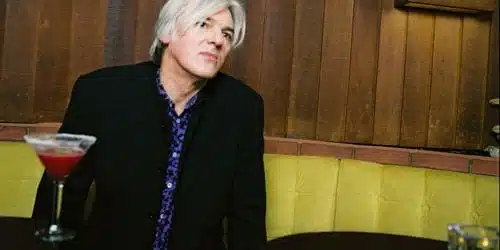
A Robyn Hitchcock album always sounds like a Robyn Hitchcock album. Whether he’s fronting psych-pop band the Soft Boys, playing a solo acoustic show, whipping up college rock songs with the Egyptians, or working with his latest outfit, the Venus 3, Hitchcock’s immediately recognizable voice seems to push his musical accompaniment to the background. This aspect of the Robyn Hitchcock experience ensures continuity across his discography, but it could also become a crutch, or even a hindrance, if Robyn were to let it. After all, when critics and consumers start describing an artist’s latest release with phrases like, “It’s another okay album from [insert act here],” that’s when you know it’s time to bring out the defibrillators, because that act’s career has started to die. Hitchcock has continually avoided this pitfall by reinventing himself. Sometimes, this comes in the form of major changes, like breaking up a band or starting a new one. On other occasions, the changes are more subtle, but equally effective in shaking up the status quo.
On Goodnight Oslo, Robyn Hitchcock changes the formula that he and his latest sidemen — guitarist Peter Buck, bassist Scott McCaughey, and drummer Bill Rieflin (in essence, 60% of R.E.M.) — established on the first Venus 3 album, 2006’s Olé Tarantula. That loose and jammy record felt like its songs were captured on their second or third run-throughs. By comparison, Goodnight Oslo is Hitchcock’s most tightly arranged album of the decade. What it harkens to most is his ’80s heyday, when Robyn reveled in neatly constructed pop gems with glorious harmonies.
McCaughey is a great backup singer and contributes plentifully here. Also adding layers of vocals behind Hitchcock are former Egyptian Morris Windsor, the Decemberists’ Colin Meloy, and Harvey Danger’s Sean Nelson (an opening act on a 2006 Venus 3 tour). The final 30 seconds of Goodnight Oslo‘s fourth track, “I’m Falling,” is just Byrds-y guitar plucking and a heavenly choir of voices. While that’s the most pronounced use of backing vocals on the record, they appear generously throughout. The buzzing, ambling, ’60s-sounding “Saturday Groovers” features call-and-response, country-influenced close harmonies, and a bouncy “bah-bah-bah-dah” refrain. There’s nothing like well-executed backing vocals to suggest that the musicians in question really took the time and care to make their songs the best they could be. The players are literally committing more of their anatomies to the music, and this commitment shines through.
Another great way to punch up your record: horns. Now, Mr. Hitchcock has been very shy about the implementation of brass throughout his career. He felt he got burned by the suggestion to use saxophone on his 1982 album, Groovy Decay. Horns are used wonderfully here, though. On “Up to Our Nex”, blurts of trumpet emphasize the (perhaps falsely?) celebratory nature of a song in which being “up to our necks in love” is both “so rad” and “so sad”. On R&B-ish opener “What You Is”, a dab of brass in the chorus gives the song’s build-up just a little more pizzazz. Elsewhere on the album, other instruments are brought in to add a certain flavor, like lap steel on the beautiful, corpuscular “Hurry for the Sky”, or Dylanesque harmonica on the disc’s other introspective tune, the R.E.M.-circa-1991-like “16 Years”.
These factors make Goodnight Oslo a good-sounding album, but it is Robyn Hitchcock, himself, who makes this a great record. Frankly, anyone with a decent budget could implement backup singers and horns. But few (if any) other artists could create a lovely and lilting tune like “TLC”. The title is an initialism for a trio of psycho-pharmaceuticals, the names of which Hitchcock intones in delicate tenor over strings and brushed snare. A big part of Hitchcock’s appeal over the years has been his lyrics, with their tangential and dreamlike logic. On this new album, he works his lexical mojo once more: “Settle where the compass points / In the belly, in the joints / The President just made a noise / He’s sorry if I disappoint you.” These lines are from a sinister-sounding verse to “Your Head Here”, a song whose transition into the chorus is marked by a comically gruff voice singing, “Ring my chimes, I’m a ding-dong daddy.” The point being, as with the jump-cut films your brain screens for you while sleep, you never know what plot twist is coming next in a Robyn Hitchcock song.
Nor is it possible to anticipate what will come with a new Hitchcock album. In the 2000s alone, he has issued a solo acoustic album, recreated a live Bob Dylan bootleg, joined forces with Gillian Welch and Dave Rawlings for an Americana outing, and has now crafted two fairly dissimilar pop/rock albums with the Venus 3. His work with this latest band has certainly been the highlight of his output for this decade, which is brought to a very satisfying close by the excellent Goodnight Oslo.

